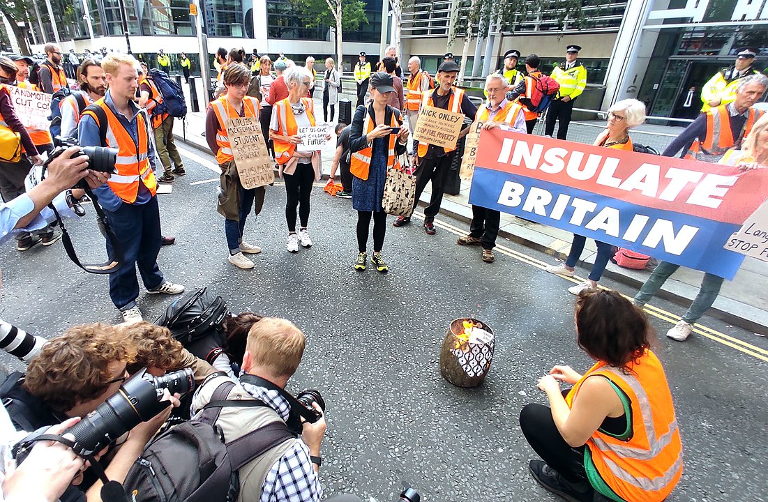The UK government has proposed some worrying amendments to its already draconian policing bill. The amendments will directly target environmental activists and are a response to direct action protests from groups such as Extinction Rebellion and Insulate Britain, and protests against the HS2 high speed railway.
Proposed changes to the Police, Crime, Sentencing and Courts Bill would grant police additional powers to restrict protests when deemed to “threaten public order or stop people from getting on with their daily lives”. The proposed legislation represents a dangerous threat to essential democratic and civil liberties such as the right to protest.
And it does so especially during times of accelerating climate and biodiversity breakdown when, as the IPCC (Intergovernmental Panel on Climate Change) has repeatedly urged, a radical departure from business as usual is exactly what we need.
Designed to be disruptive
Nonviolent direct actions such as road blockades and civil disobedience are a key fixture of social and environmental movements. These tactics are designed to be disruptive to highlight the urgency of a particular issue and the failures of the status quo.
The most interventionist strategies such as lock-ons – when activists lock themselves to railings or buildings – are often deployed when a situation is deemed especially urgent, and when voting, lobbying and other traditional modes of political participation are deemed insufficient.
Activists might argue that this applies to climate change: after decades of international negotiations, and despite radical decreases in socioeconomic activity induced by a global pandemic, the world is still on track to reach 2.4℃ of warming by 2100.
The policing bill first came before the House of Commons in March 2021 in the wake of Black Lives Matter protests. It sought to add “noise” to the list of intervenable offences under the Public Order Act 1986, which enables police to restrict a protest if they deem it risks “serious public disorder”. It grants alarming discretion and powers to police officers: if they believe that someone nearby might be “distressed” by a protest, they have grounds to intervene.
The newest amendments, inserted at the last minute while the bill is passing through the House of Lords, were spearheaded by Home Secretary Priti Patel. They follow the disruption caused by activists from Insulate Britain, who blockaded major motorways in the lead-up to the COP26 climate summit.
Sections 319C – 319F are especially troubling. They would allow police officers to stop and search anyone suspected of potential “public nuisance” or “serious disruption to two or more individuals or to an organisation”. People who refuse to comply, or who engage in tactics such as lock-ons and the “wilful obstruction of highways”, could face imprisonment for up to 51 weeks.
The Green Scare
The draconian bill has historical and contemporary parallels. For instance, in the “Green Scare” era in 2000s US, which followed arson attacks against a ski resort in Colorado by the group Earth Liberation Front (ELF), environmental activists were criminalised and labelled the nation’s lead domestic terrorist threat.
The legal definition of terrorism was even expanded to include any act damaging or threatening to damage “any building, vehicle, or other real or personal property used in interstate or foreign commerce or in any activity affecting interstate or foreign commerce”. Those implicated faced up to ten years in prison. In the words of political theorist Steve Vanderheiden, the US government targeted such groups with such zealousness because they posed a viable threat not to lives but to “the idea of profits and commerce at any price”.
Earlier this year, I and over 400 other experts signed an open letter warning of mounting government criminalisation of environmental protectors around the world. Examples include new anti-terrorism legislation in the Philippines which has led to violent police action against climate protesters; hefty fines in Italy for activists mobilising against the Trans Adriatic Pipeline; and new legislation in Queensland, Australia targeting environmental activism ostensibly in the name of “public order”. Environmental protectors across Latin America continually risk not only imprisonment but their lives, with 277 murdered in 2020 alone.
Protection, not prosecution
While committing to net zero emissions by 2050, the UK government seeks to further hamper the efforts of those risking life and limb to stem the worst effects of climate and ecological breakdown. If Patel and others really wished to “protect the public”, they’d start by immediately phasing out the 40 new fossil projects the UK currently has in the pipeline. They’d divert their energy towards curbing the activities of top fossil corporations knowingly contributing over one-third of modern greenhouse gas emissions.
The disruption caused by activists blockading roads is virtually non-existent compared to the widespread loss of lives and livelihoods that will result without urgent action on climate change. These are desperate times. Disrupting business as usual – and supporting those doing so – is our only hope.
![]()
This article is republished from The Conversation under a Creative Commons license. Read the original article.
Teaser photo credit: By JamieLowe68 – Own work, CC BY-SA 4.0, https://commons.wikimedia.org/w/index.php?curid=110350179





